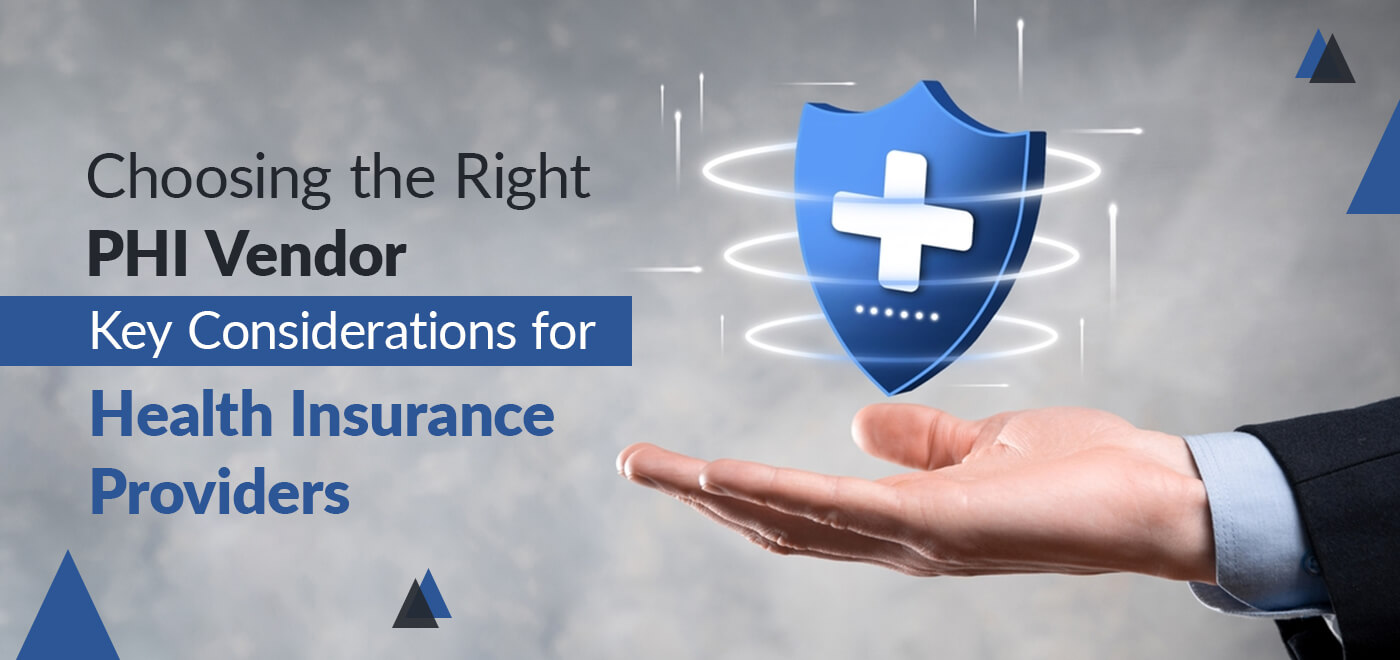This user-friendly guide is here to assist you with a crucial task – choosing the right Protected Health Information (PHI) Vendor. As a provider of health insurance, you know just how vital and sensitive PHI can be. This data, which includes all identifiable health info, is the foundation of your operations. It affects everything, from which health insurance enrollment software you choose to member services and handling of claims.
Protected Health Information (PHI) and PHI vendors in the health insurance industry
But what exactly is a PHI Vendor, and why is their role so important in the world of health insurance? Simply put, a PHI vendor is an entity that manages, secures, and stores PHI for health insurance providers. A great vendor not only guarantees safe and compliant data handling but also boosts your day-to-day operations, including your insurance enrollment software.
The main aim of this piece is straightforward and important: to help health insurance providers like you pick the best vendor for your specific needs. The focus is on ‘best,’ and this guide’s purpose is to shine a light on what you should think about when picking a vendor.
A top-notch vendor should offer more than complying with the Health Insurance Portability and Accountability Act (HIPAA). They should also offer strong data security measures, have a good reputation in the industry, and provide top-tier customer support. This vendor should also be tech-savvy, including easy integration with your current insurance enrollment software.
In the fast-paced world of health insurance, your vendor choice can significantly influence how well your operations run and the quality of service delivery. This is a choice that requires careful thought, full evaluation, and strategic decision-making. This guide is here to simplify that task for you.
Purpose of the Article
This piece frequently stresses the importance of choosing the right PHI vendor. A good vendor can make your operations run smoother, ensure better workflow and boost performance. Your choice will directly affect how you manage and protect the large amounts of sensitive health information your members trust you with.
However, this guide is here to support you in making this key decision. We aim to make clear the steps towards picking the right vendor, highlighting the many things you need to keep in mind during this process. We’ll explore the factors to consider and the potential hurdles you might encounter in a successful vendor selection process.
So, let’s start this journey together. We’ll work towards picking the right vendor, one that fits your needs, aligns with your values and bolsters your commitment to offering top services to your members. The path ahead might seem complicated, but with the right guide, the journey can be enlightening and rewarding.
PHI and PHI Vendors
When we say “PHI,” we mean Protected Health Information. It covers all health data tied to a person. So, think of it as a chest full of sensitive details, from medical history and treatment data to basic information about a person. Health insurance software for brokers uses this data to shape policies and handle claims.
What about PHI Vendors? Simply put, a PHI Vendor is a third-party group that looks after, stores and keeps PHI safe for health insurance providers. They aren’t just keepers of data but vital partners that help make your health insurance operations run smoothly.
PHI Vendors in the Health Insurance Industry
Think of PHI Vendors as skilled sailors guiding a ship across a sea of health data. They have the tools and know-how to ensure your health insurance provider stays on track, follows the rules, and keeps its precious PHI cargo safe.
It’s tough to overstate the importance of PHI Vendors in the health insurance sector. Imagine trying to use insurance software for brokers without a secure, easy way to manage PHI. You’d be in a tough spot, always dealing with data management, security, and compliance problems.
But with a dependable vendor, things look much better. These vendors offer a safe place for your PHI and ensure you meet all relevant regulations. They take care of data storage, backup, and security, leaving you to focus on your main job – offering great service to your insurance clients.
Also, the right PHI Vendor can also smoothly link up with your insurance software for brokers. This improves the system’s functionality and makes operations smoother. When you know your data handling and protection are in good hands, you can concentrate on bettering your services, making customers happier, and expanding your business.
Choosing a vendor is not a minor choice; it’s a strategic move. It’s about finding a partner who gets your needs, shares your goals, and can safely handle the sensitive health data that are central to your work.
As we look deeper into picking the right vendor, remember this isn’t just about outsourcing a task. It’s about choosing a partner for your journey across the vast and often complex sea of health data management. It’s about finding the right guide for your ship.
Importance of Selecting the Right PHI Vendor
How a Good PHI Vendor Can Streamline Operations
Let’s think of a PHI Vendor as a top-notch leader of an orchestra, where every player stands for a different part of your work. Without the leader, the players might find it hard to play in tune, leading to a jumbled-up show. But with a good leader, each player knows when and how to do their part, making a beautiful tune.
In the same way, a top-notch vendor brings the tune to your work. They deal with the key but tricky jobs of PHI care and safety, letting you pay attention to your main tasks. Just like you trust your health insurance software companies for great tech answers, you can trust your vendor for smooth data work.
A top-notch vendor fits well with your current systems. Also, they are like a well-run part of your machine, helping the whole thing work well. They can work side by side with health insurance software firms, making the system better and cutting out repeat work.
Ensuring Proper PHI Handling and Compliance with Health Data Regulations
Imagine a PHI Vendor as a sure guard, watching over the precious gem – PHI – from danger and misuse. They do not just keep and look after this data; they also make sure it’s safe and used right under tight health data rules.
The job of the vendor is more than just looking after data. They have to follow the Health Insurance Portability and Accountability Act (HIPAA) and other key rules. In a world where data leaks and fines for not following rules can be really bad, the importance of this job is huge.
The right vendor really knows these rules. They use strong safety steps, like code and safe access checks, to keep the data safe. They also often update these steps to stay ahead of changing dangers and rules.
Just like health insurance software firms are key to your work, the PHI Vendor is key to your data safety plan. So, the right vendor makes sure that the PHI is always dealt with right, kept safe from dangers, and used following all the key rules.
Picking the right vendor is not just a word choice; it’s a smart choice that can really affect your ability to give top service to your members. It’s about finding a partner who can make sure the PHI is looked after and kept safe and well, making your work better and rule-following better.
Essential Factors to Consider When Choosing a PHI Vendor
Compliance with Regulations
Imagine walking through a thick forest with many paths ahead. The Health Insurance Portability and Accountability Act (HIPAA) is your guide, showing the right way in the complex world of PHI handling. All PHI Vendors must obey HIPAA; it’s a legal must-do.
A PHI Vendor that follows HIPAA closely shields your work from costly errors. They make sure that PHI stays secret, ready to use, and untouched, following the rules on Privacy, Security, and Breach Notification that HIPAA sets.
In our connected world, Healthcare EDI Companies may often deal with data that crosses borders. Like a good cook uses different ingredients to make a tasty dish, your vendor must mix different international data safety rules.
A good vendor should know not only HIPAA but also other global rules like the General Data Protection Regulation (GDPR) in Europe. This knowledge helps them handle PHI well while staying in line with all rules.
Security and Data Privacy Measures
To get why security in PHI handling is so important, picture your PHI as a valuable relic in a museum. Without great security, this relic is at risk of theft or harm. Just like that, PHI is open to threats without top security.
A PHI Vendor should not just obey rules but also actively guard PHI from possible threats. Their security should be your castle, keeping PHI safe from breaches and illegal access.
A good vendor uses different security actions like encryption and secure access controls. Encryption is like changing your data into a secret language that only allows people to read, protecting it when sent. Secure access controls; meanwhile, make sure only allowed people can see or use the PHI, acting as guards to your data.
Vendor Reputation and Experience
When picking a vendor, think of their past work as their tried and tested wisdom. A vendor with lots of experience has likely faced many situations and hurdles, giving them the skills to handle your PHI well.
An experienced PHI Vendor can guide you through the tricky world of PHI handling with ease, like a seasoned hiker leading you safely on a tough trail.
A vendor’s reputation shows their reliability and professionalism. Look for feedback from past clients, ask about their reputation in the industry, and seek references. This check gives you a glimpse into their customer service, problem-solving skills, and dedication to client happiness.
Technical Capabilities
In a world where tech changes fast, your vendor must keep up. A PHI Vendor with current tech and software systems is ready for any challenges. This readiness ensures efficiency and keeps your work up to date.
A good vendor should also work well with a custom health insurance software development company, improving the connection between the PHI handling system and your work software.
Being able to work with existing systems is crucial. A vendor should fit in smoothly with your current setup. System integration cuts out repeats, simplifies work, and makes for a smoother workflow.
Service Agreement and Customer Support
Service terms set the rules of your relationship with the PHI Vendor. Clear, fair terms are like a detailed map, marking the path of your partnership. They set hopes, layout duties, and set penalties for not meeting the standards.
Lastly, good customer help is the base of a successful partnership with a vendor. Picture the customer helping as your helper, always there to help when you face a problem. Quick, round-the-clock customer help makes sure any issues or questions you have are solved quickly, reducing potential work stoppages.
Navigating the Vendor Selection Process
Embarking on the quest to pick a vendor can be like walking through a complicated maze. We aim to make it easier for you in this part of the article, providing a handy guide on how to spot, assess, and pick the right PHI Vendor. In this discussion, the term Benefits Administration Outsourcing Companies often mingles with PHI Vendors. They both have similar roles in the health insurance world.
Identify Potential Vendors
The first step in your quest involves finding potential vendors. Kick off by figuring out your specific needs and goals. This understanding helps you to build a vendor profile matching your needs. With this profile in hand, you can use different strategies to locate potential vendors.
A useful approach is an online search. Health insurance software firms’ websites typically list their services, making it easy to spot possible PHI Vendors. So, you can also get leads from trade shows, industry publications, and professional networking sites.
Evaluate Vendors
The next part of your quest is to assess potential vendors. Here, you’ll take a close look at possible PHI Vendors based on vital considerations stated earlier. This phase is essential as it pinpoints a vendor’s fit to your specific needs.
Take into account the vendor’s adherence to rules like HIPAA and other global data protection laws. Check the security and data privacy measures they have. Is their system sturdy enough to manage your PHI needs?
Look closely at their reputation and experience. You can get this information from past clients, online feedback, and their track record in the industry. The vendor’s technical prowess, like modern technology and software systems, also has a significant role in the assessment process.
Make the Final Selection
The last part of your quest is to make the final vendor selection. This stage is about picking a vendor whose skills match your needs. Once you have a shortlist of potential vendors, do a thorough analysis comparing the strengths and weaknesses of each.
When you’ve narrowed it down to your final option, it’s time to negotiate the terms. Also, make sure that you comprehend every part of the agreement, from service delivery to costs and customer support.
Remember, picking a PHI Vendor is similar to choosing a travel buddy for your journey in the health insurance industry. A smart choice will determine the smoothness of your journey and the accomplishment of your goals. With this guide, you’re now ready to set out on this important quest. Let’s embark on this process with confidence, knowing the right partner is out there and eager to help you succeed.
Potential Challenges and How to Overcome Them
- Unfamiliarity with Regulations: A typical challenge is not knowing rules like HIPAA or GDPR. It’s similar to trying to play a game without understanding its rules. This lack of knowledge can lead to breaking the rules and big fines.
- Complicated Technical Jargon: Technical words can confuse many health insurance providers, making it tough to grasp fully what a PHI Vendor can do.
- Difficulty Assessing Vendor Capabilities: Often, judging the technical abilities of a vendor becomes hard. It’s like trying to assess the worth of a rare gem without the right knowledge and tools.
- Lack of Transparent Pricing: Unclear pricing from vendors can stop you. It’s like shopping without price tags, making plans, and comparing tough.
Tips to Mitigate These Issues
- Leveraging Employee Benefits Solution Providers: Linking up with professional Employee Benefits Solution Providers can help understand the complexity of rules. They act as your guide, giving insights into the legal scene and assisting you in making sure that the chosen vendor follows the rules.
- Clear Communication: Clear communication with the vendor can help overcome the barrier of technical jargon. Ask them to explain their services in simple words. It’s like asking for a translation of a foreign language book, making it simpler to understand and judge their services.
- Use of Third-Party Validators: Independent validators can help in judging the abilities of a PHI Vendor. Also, these validators give a fair judgment, much like an expert gemologist assessing a rare gem.
- Asking for Clear Pricing Structures: Lastly, ask the vendors to share clear pricing structures beforehand. It’s like asking for price tags on all products in a shop. This data aids in planning and comparing vendors effectively.
These snags in the vendor-picking process can seem scary, but remember; every problem has a fix. By addressing these usual snags and using the tips to lessen them, you can move through the process easily. This informed path will guide you to the right PHI Vendor, helping you in managing PHI efficiently and according to the rules.
Conclusion
Our trip into the world of PHI Vendors and their key role in the health insurance field has been a great learning journey. We’ve sorted through tricky rules, conquered complex tech issues, and navigated the tough path of picking the right vendor.
At the journey’s end, it’s clear how vital the right vendor is for health insurance companies. Like a strong rope helping a climber’s ascent, a good vendor not just eases the climb but ensures a safer journey, securing every bit of health data.
The route to the right PHI Vendor may seem as tough as climbing a high peak. But remember, every successful climb begins with a single step. Don’t stand at the base, mulling over the climb. Start your trip today. Make your first move towards finding the right vendor and Employee Benefits Solution Providers In the USA, and before you know it, you’ll be at the top, basking in the view of smooth operations, happy policyholders, and easy PHI management.
After all, success isn’t just about reaching the top. It’s about beating the challenges along the way. So start your climb today with Toporgs and find your success in the realm of PHI management!
FAQs
PHI stands for Protected Health Information. It’s the personal health data that a healthcare provider uses, shares, or stores in any form. PHI is vital in the health insurance industry. It’s at the center of everything. Be it setting policy premiums, dealing with claims, or customizing products for policyholders, PHI is fundamental to these processes.
Think of a PHI Vendor as the architect of a strong bridge. This bridge links health insurers to secure, easy, and efficient PHI management. They make sure data is stored safely and handle its transfer and processing. PHI Vendors help health insurers to meet data protection rules, better their operations, and build stronger bonds with their policyholders.
Picking the right PHI Vendor is like picking the best car for a long trip. You need it to be reliable, efficient, and ready for any challenges. The right PHI Vendor ensures smooth operations, meets health data rules, and improves service quality.
When picking a PHI Vendor, several things are important. Look at how well the vendor follows HIPAA and other data protection rules. Check their security, reputation, experience, technical skills, and customer support. Make sure to read their service agreement carefully to see if it’s clear and fair.
Choosing a vendor isn’t always easy. It can feel like steering a boat through a storm. You might face issues like not having enough clear data to compare vendors, understanding technical terms, making sure the vendor meets your needs, and negotiating a fair and clear service deal.





